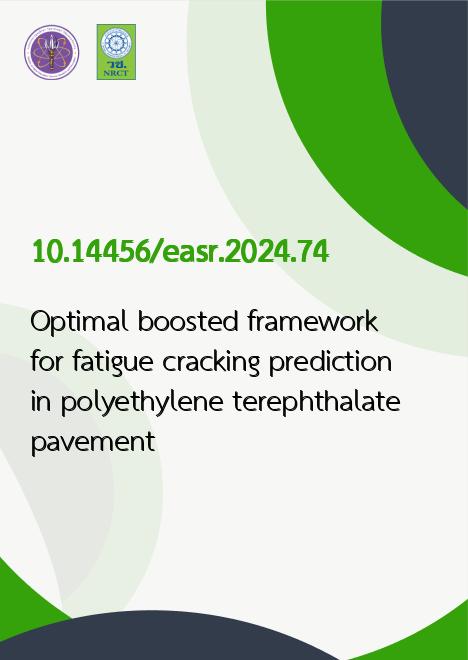
|
Optimal boosted framework for fatigue cracking prediction in polyethylene terephthalate pavement |
|---|---|
| รหัสดีโอไอ | |
| Creator | 1. Anand Prakash Chaturvedi 2. Sanjeev Kumar Suman |
| Title | Optimal boosted framework for fatigue cracking prediction in polyethylene terephthalate pavement |
| Publisher | Faculty of Engineering, Khon Kaen University |
| Publication Year | 2567 |
| Journal Title | Engineering and Applied Science Research |
| Journal Vol. | 51 |
| Journal No. | 6 |
| Page no. | 784-799 |
| Keyword | Hyena optimization, Polymer modified bitumen, Marshall coefficient, Fatigue crack prediction |
| URL Website | https://ph01.tci-thaijo.org/index.php/easr/index |
| Website title | Engineering and Applied Science Research |
| ISSN | 2539-6161 |
| Abstract | Depleting natural resources for construction purposes and research needs in the field of civil engineering is becoming a dependable process. To minimize this degradation process several techniques are implemented, one such method is using software approaches in research fields. In the consideration of the former investigation works, the focus point of the works is mainly on Crack Prediction on bitumen pavements. Since the bitumen pavement undergoes repeated loading under wheel loads in static conditions during traffic, and is dynamically loaded during the movement of fast moving vehicles. The strength parameters related to the fatigue limit of the bitumen are not analysed. Hence the fatigue limit of the bitumen should also be analysed. To analyze such conditions, deep learning with standardizing features is implemented to estimate the effective Strength parameters and to forecast the essential outcomes. In this study, the Fatigue Cracking Prediction of the Polymer Modified Bitumen (PMB) of grade 40 in Polyethylene Terephthalate (PET) Pavement is carried out. The Suggested Methodology is termed as Hyena based Curriculum Learning (HbCL). It is implemented in the Accuracy Prediction of Fatigue Cracking behaviour of PET pavement at different temperatures in dynamic and static load conditions. The fitness function in the optimization was triggered initially, to determine the ideal strength parameters of the Polymer Modified Bitumen as well as the PET. The tensile strength of the proposed model is 410 KPa in dynamic loading. The compression strength of the proposed model decreases with an increase in temperature. The rutting depth of the proposed model is between 1.7728mm and 1.6870mm. The Marshall Coefficient value gained was 2.7 KN/mm as the maximum for static loading. A value of 1.77mm in maximum is achieved by fatigue crack depth under dynamical load. The mean fatigue crack prediction accuracy estimated was 96.1%. |